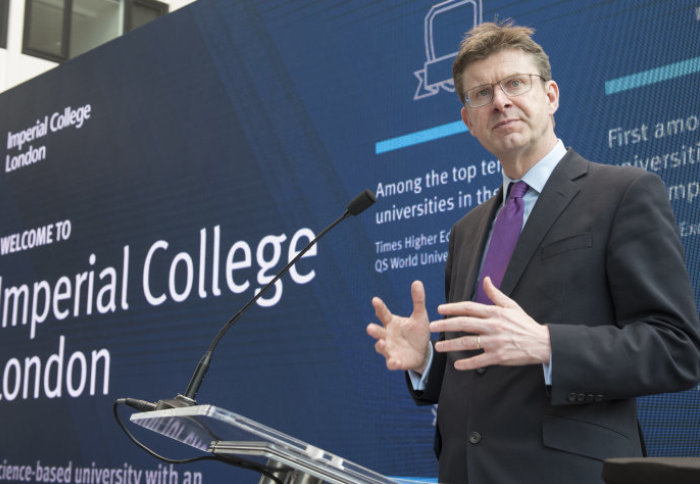Success on an industrial scale: Imperial projects driving innovation

Business Secretary Greg Clark launched the AI sector deal at Imperial
Imperial College London has played a leading role in delivering the UK’s industrial strategy since it was launched one year ago.
Through the Industrial Strategy Challenge Fund – Imperial has received more than £11m to drive scientific advances in areas including AI, robotics, healthcare and batteries for electric vehicles.
Professor Nick Jennings, Vice Provost (Research and Enterprise) said: “Imperial’s success in securing this funding recognises our position as a world class university, producing impactful research to benefit society and the UK economy.
“Our core strengths and emphasis on multidisciplinarity and collaboration mean that we are ideally placed to address the greatest challenges society will face in the next five years.
“We are excited to work on future calls and open to exploring more collaborations, both with our existing partners and with new ones."
Here are some of the projects that are helping to meet some of the UK's grand challenges:
Speeding up cancer diagnosis with AI

AI and machine learning can help clinicians to improve and speed up diagnosis for patients with a number of conditions such as dementia, heart failure and cancer.
The new London Medical Imaging & Artificial Intelligence Centre for Value-Based Healthcare will train sophisticated artificial intelligence (AI) algorithms from thousands of NHS medical images and patient data, to create tools that will help clinicians to more accurately and more quickly diagnose and decide the best treatment and care.
Professor Daniel Rueckert, Head of Imperial's Department of Computing, said: "AI has tremendous potential in radiology and medical imaging.
"The Centre will take the lead in translating cutting edge AI research from the lab into the clinic while addressing challenges such as the verification of AI systems and ensuring their interpretability, which is vital for enabling safe deployment in the NHS."
Charging electric vehicles

Greg Clark, the Secretary of State for Business, Energy and Industrial Strategy, has announced the foundation of a new independent, national, battery technology research institute - The Faraday Institution.
The core aim of the institution is to ensure that the UK remains a world leader in novel battery technologies and energy storage for electric vehicles and cement the future of the UK automotive industry.
Imperial’s team will be led by Professor Nigel Brandon, Dr Greg Offer and Dr Billy Wu, and coordinated by Energy Futures Lab.
Dr Offer: “It is great to see the Government’s Industrial strategy bearing fruit.
“We are delighted to be involved at the beginning of what I know will be an important initiative for energy storage in the UK.”
Imperial’s Electrochemical Science & Engineering group has won £1.4m to fund six projects investigating the issues around batteries for electric vehicles.
Space and marine robots
Imperial are working with other institutions to enable space robots to perform more complex tasks on long-duration missions with minimal dependence on ground crew.
The aim of the FAIR-SPACE project - co-funded by the UK Space Agency - is to go beyond the-state-of-the-art in robotic sensing and perception, mobility and manipulation, on-board and on-ground autonomous capabilities, and human-robot interaction.
Imperial academics are also part of the Offshore Robotics for Certification of Assets (ORCA) hub, which will develop robotics and AI technologies for use in extreme and unpredictable environments.
The Hub will create robot-assisted asset inspection and maintenance technologies that are capable of making autonomous and semi-autonomous decisions and interventions across aerial, topside and marine domains.
Helping stroke patients regain arm function

Over 500 million people worldwide live with arm disability due toneurological or musculoskeletal disease such as stroke or arthritis.
The most effective therapy to regain arm function is repetitive physiotherapy but access to physiotherapy is significantly limited by the number of available therapists.
gripAble™, has been launched as a new Imperial College spin-out company which aims to make training of arm and hand function more accessible.
The company was founded through a collaboration between academics and clinicians from across Imperial College London, including Dr Paul Bentley, Clinical Senior Lecturer at Imperial College London and Honorary Consultant Neurologist at Imperial College Healthcare NHS Trust
Dr Bentley said: “Unlike other therapies currently on the NHS, gripAble™ is a low cost device which can be used in hospitals and independently by patients at home. As such it could potentially help save the health service millions of pounds.”
Industrial Strategy Challenge Fund
Imperial are looking to seed fund potential ISCF projects with both prospective and existing partners. There will be a new wave of funding in Spring 2019.
For any questions or queries about proposals please speak with Fiona Jamieson f.jamieson@imperial.ac.uk
Article text (excluding photos or graphics) © Imperial College London.
Photos and graphics subject to third party copyright used with permission or © Imperial College London.
Reporter
Stephen Johns
Communications Division
